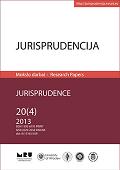Mokesčio apskaičiavimas taikant turinio viršenybės prieš formą principą
Tax Calculation Using the Principle of Substance over Form
Author(s): Egidija PuzinskaitėSubject(s): Law, Constitution, Jurisprudence
Published by: Mykolas Romeris University
Keywords: tax; taxpayer; tax administrator; tax benefit; tax implications; tax advantage; abuse of rights; economic feasibility; formal expression of a transaction; artificial transaction; content of an economic operation
Summary/Abstract: With the help of systemic and legal analysis, historical, linguistic, logical document analysis and comparative methods and relying on national law, the works of Lithuanian scientists and legal professionals and tax dispute case analysis, this article, by applying the principle of substance over form, solves problems arising within the context of calculating tax. Using case law analysis as its basis, the article explores the taxpayer’s duty to calculate tax, provides recommendations for the application of a period of limitation for calculating taxes and identifies cases, where the burden of proof of correctness of tax calculation lies within the tax administrator and within the taxpayer. The article provides taxpayers guidelines about how to avoid tax violations. The jurisdiction of the High Administrative Court in the area of tax disputes, specifically in applying the principle of substance over form, is examined in detail. The article consists of an introduction, three chapters (which are subsequently subdivided into subchapters) and conclusions. Chapter One explores the substance of the taxpayer’s duty to calculate taxes and it also includes one subchapter that analyses the application of a period of limitation for calculating and recalculating taxes. Chapter Two identifies which specific participants in tax and legal relations bear the burden of proof, namely when the burden of proof lies within the taxpayer and when it lies within the tax administrator. Chapter Three analyses the principle of substance over form. Chapter Four analyses the application of the principle of substance over form. The article ends with conclusions. The article has been prepared on the basis of the case law of the Lithuanian Supreme Administrative Court concerning the application of tax legislation. The aim of the study is to conclude that the principle of substance over form can be applied after assessing the subjective aim of the transaction, the economic content of the transaction, the selected legal form of the transaction and its adequacy for specific conditions, the justification or motive behind the transaction, and tax benefits. The most favourable explanation of the principle of substance over form for a taxpayer is provided in Belgium, where it is prohibited to use tax measures to interfere with the civil legal assessment of a transaction. When there is insufficient evidence to confirm the circumstances specified by either the taxpayer or the tax administrator, a resolution is adopted against the party that failed to provide proof of the circumstances. The following could be the basis for the application of substance over form in tax calculation: failed transactions based on issued accounting documents; intermediate or sham (optional) transactions; a short time interval between transactions in the common chain of transactions or plurality of transactions over a short period of time, when after the final transaction the original property owner continues to
Journal: Jurisprudencija
- Issue Year: 20/2013
- Issue No: 4
- Page Range: 1409–1426
- Page Count: 18
- Language: Lithuanian

